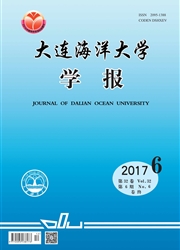

 中文摘要:
中文摘要:
为调查环境因子对微生物被膜形成能力的影响以及在此条件下形成的微生物被膜对厚壳贻贝Mytilus coruscus稚贝(壳长为1.81 mm±0.13 mm)附着的影响,通过显微共聚焦技术和荧光染色技术,探讨了在18℃条件下盐度为10、20、30时和盐度为30的条件下温度为8、18、28℃时,环境因子对希瓦氏细菌Shewanella loihica ECSMB14101形成微生物被膜产生的影响,调查了上述环境下形成微生物被膜的细菌密度、分布、膜厚等生物学特性及其对厚壳贻贝稚贝附着的影响。结果表明:S.loihica ECSMB14101形成微生物被膜的最终密度随盐度的升高而增加;不同密度的微生物被膜诱导活性不同,且与盐度呈线性关系;微生物被膜上细菌密度随温度的升高而增多,在8℃和18℃时对稚贝的附着诱导活性有显著性差异(P〈0.05),附着率分别为31%和68%,18℃与28℃时的微生物被膜诱导活性无显著性差异(P〉0.05);随盐度和温度的上升,微生物被膜上的细菌分布逐渐密集,膜厚显著增加,且在盐度为30、温度为28℃条件下微生物被膜的膜厚达到最大值(4.4μm±0.1μm);在温度为18℃、盐度为30条件下,膜厚的最大值为(4.3±0.1)μm。研究表明,盐度和温度改变微生物被膜的生物学特性,并导致贻贝附着率的显著差异。
 英文摘要:
英文摘要:
Effects of water temperature( 8,18 and 28 ℃) and salinity of 10,20,and 30 on Shewanella loihica ECSMB14101 biofilms and subsequent effect on settlement of plantigrades of mussel Mytilus coruscus with shell length of( 1.81±0.13) mm were studied. The confocal laser scanning microscopy technique was used to investigate the characteristics of biofilms including biofilm thickness and the distribution of bacteria in biofilms. The results showed that the final density and thickness of the ECSMB14101 biofilm were increased with increase in temperature and salinity,with the maximal thickness of( 4.4±0.1) μm at a salinity of 30 and at temperature of 28 ℃. The settlement inducing activities of the biofilms were different under different conditions of temperatures and salinities.The amount of bacteria in the biofilm was found to be increased with the increasing temperature,and the mussel had settlement rate of 31% at 8 ℃ and 68% at 18 ℃,with significant difference( P〈0.05). In contrast,there was no significant difference in inducing activity at 18 ℃ and 28 ℃( P〈0.05). The findings explored the interplay between environmental factors,biofilm formation,and settlement of mussel plantigrades.
 同期刊论文项目
同期刊论文项目
 同项目期刊论文
同项目期刊论文
 期刊信息
期刊信息
